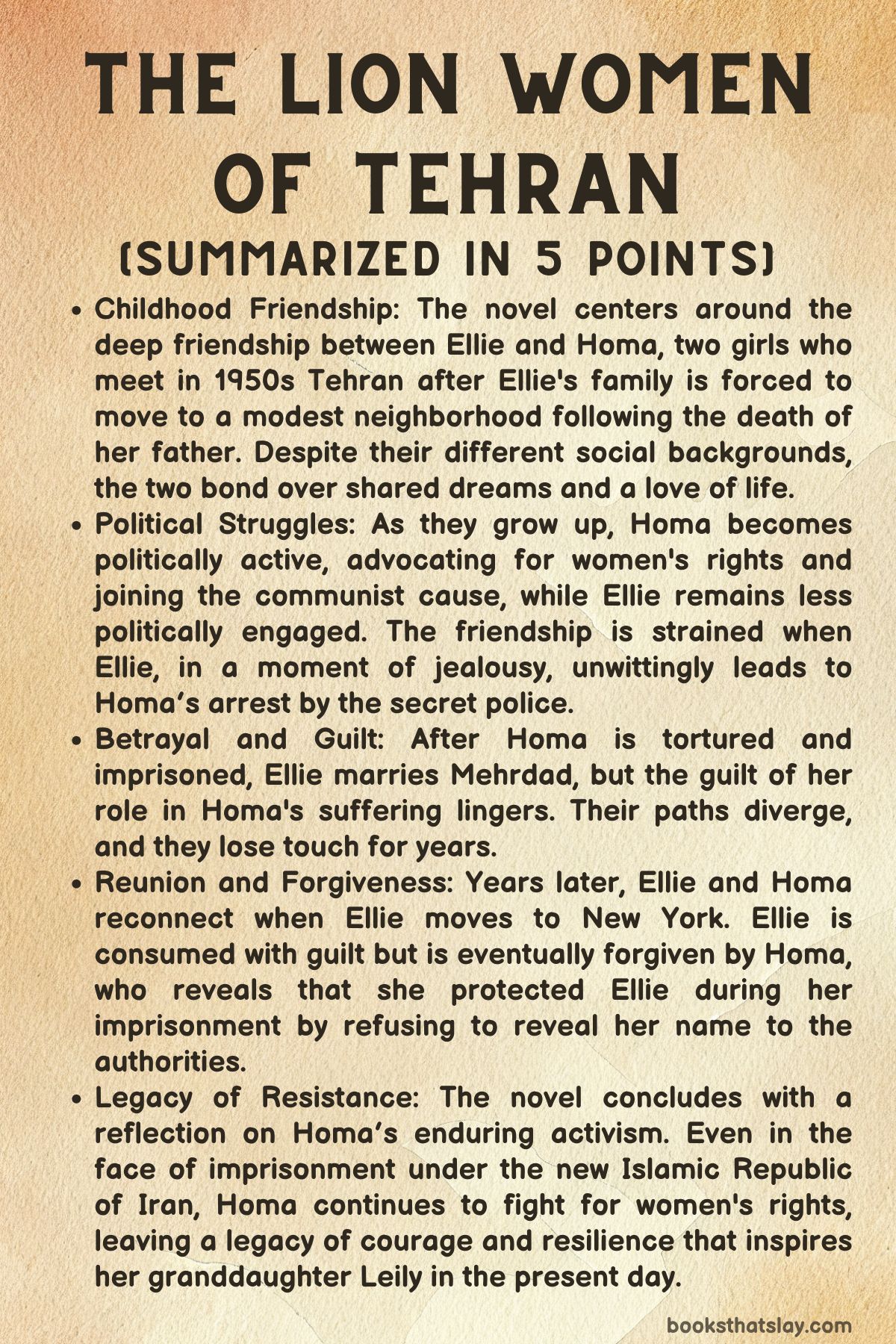The Lion Women of Tehran Summary, Characters and Themes
The Lion Women of Tehran by Marjan Kamali is a story about friendship, love, betrayal, and resilience set against decades of Iran’s turbulent history.
At its heart is the lifelong bond between Ellie and Homa, two girls who meet in Tehran in the 1950s and grow up with different dreams and struggles. While Ellie seeks stability, love, and family, Homa dedicates herself to justice and women’s rights, even as her choices place her in danger. Through the shifting landscapes of revolution, exile, and sacrifice, their stories show how women carry strength across generations, passing on hope and courage in the face of oppression.
Summary
Ellie’s adult life in New York is haunted by her past in Iran. Memories of her childhood friend Homa resurface when she receives a letter urging her to reconnect. Their friendship began in 1950, after Ellie’s father’s death left her lonely and withdrawn. At her new school, she met Homa, whose warmth and energy transformed Ellie’s life.
The girls quickly became inseparable. While Ellie’s home was filled with her mother’s coldness and bitterness, Homa’s home brimmed with affection, laughter, and the smells of her mother’s cooking. Ellie envied Homa’s supportive family but found comfort in being welcomed as part of it.
As they grew, their bond deepened. Homa dreamed of becoming a judge, while Ellie longed for a simple future as a wife and mother. Despite Ellie’s mother disapproving of Homa’s family, the girls forged their own sisterhood. When Ellie’s mother remarried and forced them to move, the separation devastated them, but they exchanged tokens of their friendship: a necklace with a bird charm from Homa and a decorated notebook from Ellie. Though they parted, their love for one another endured.
Years later, Ellie thrived at a prestigious girls’ school in Tehran. She enjoyed a comfortable, westernized lifestyle, and she began courting Mehrdad, a kind young man who would later become her husband. When Homa reappeared at her school, Ellie was torn between her glamorous new life and the deep pull of her old friend. Slowly, they rekindled their closeness.
Yet their differences became more pronounced—Homa was committed to activism, joining student groups and protesting the shah’s government, while Ellie distanced herself from politics, focusing on love and marriage.
Tensions mounted during the early 1960s. Homa was outspoken about injustice and women’s rights, while Ellie sought safety and domestic happiness. Their bond was tested when Ellie, in a moment of carelessness, revealed Homa’s political activities to a colonel connected to the secret police.
Soon after, Homa was arrested, and Ellie was consumed with guilt. Homa endured imprisonment, assault, and unimaginable suffering, yet her resilience carried her forward. Upon her release, she married Abdol, a fellow activist, and had a daughter, Bahar. Meanwhile, Ellie continued her studies and married Mehrdad, creating a happy life that was shadowed by miscarriages and unspoken regrets.
By the late 1970s, Iran was roiled by revolution. Homa, now a teacher, guided young women while shielding Bahar from danger. Abdol was tragically killed in the infamous Cinema Rex fire, and Homa’s grief hardened into determination.
She joined women protesting for their rights, only to see gains reversed as Ayatollah Khomeini rose to power and restrictions grew harsher. For Homa, survival meant fighting for the next generation, and she decided Bahar’s safety required leaving Iran.
At the same time, Ellie and Mehrdad moved to New York for his academic career. Ellie adjusted to her new life, working at a department store and making friends, though she often felt disconnected.
When Homa reached out years later, Ellie learned that Abdol had died and that Homa wanted Bahar to escape Iran’s repressive regime. Ellie and Mehrdad opened their home to Bahar, embracing her as family. This reunion stirred old emotions and unresolved guilt for Ellie, who struggled to confess her role in Homa’s arrest.
In New York, Bahar adjusted to her new life, though she wrestled with adolescence, cultural differences, and longing for her mother. Ellie treated her as a daughter, and eventually Homa was able to visit.
Their reunion was bittersweet—Ellie wished to apologize, but Homa redirected the conversation to resilience and possibility. They reflected on their shared past and the symbolism of the homa bird, a creature said never to touch the ground, representing freedom and hope.
Together, they affirmed that they were lion women, women who carried courage and strength no matter the cost.
Their bond was tested again when Bahar nearly died of alcohol poisoning at a party. At the hospital, Ellie finally confessed to Homa that she had been responsible for revealing her activities years before.
Instead of anger, Homa responded with acceptance. She admitted she had protected Ellie by refusing to name her during interrogations, because their friendship mattered more than betrayal. This moment of honesty freed Ellie from decades of guilt and revealed the unbreakable nature of their relationship.
As Homa prepared to return to Iran, she left Ellie with the pink notebook from their childhood, now filled with recipes. She encouraged Ellie to pursue her own path, even suggesting she open a restaurant. Their parting showed the enduring love and respect between them, even as their lives diverged once more.
The story extends into the next generation. Decades later, Ellie runs a café in Massachusetts with Bahar, who has built a family of her own. Bahar’s daughter, Leily, grows up curious about her heritage, watching protests in Iran following the death of Mahsa Amini.
She learns that her grandmother, Homa, is still in Iran, courageously participating in demonstrations for women’s rights. In a final letter, Homa reflects on her lifelong fight, her sacrifices, and her hopes for the future. She urges Leily to embrace love fiercely and continue the legacy of resilience.
The Lion Women of Tehran is ultimately a story of friendship that survives betrayal, exile, and revolution. Ellie and Homa embody two different paths of womanhood—one focused on family and personal safety, the other on activism and justice—yet their lives remain bound together.
Across generations, their courage and love inspire the next, affirming that the strength of women can endure even the harshest of times.

Characters
Ellie
Ellie is one of the central figures of The Lion Women of Tehran, whose life reflects the conflict between tradition, personal desire, and guilt from past mistakes.
She begins as a lonely girl who finds warmth and belonging in Homa’s family. Throughout her youth, Ellie craves stability and dreams of becoming a wife and mother. Her bond with Homa is profound, but she is often torn between admiration for her friend’s strength and a desire to distance herself from political risks. Her greatest burden is the role she plays in Homa’s arrest, which leaves her with decades of guilt and self-doubt.
In adulthood, Ellie’s marriage to Mehrdad offers love but not the fulfillment of motherhood, as repeated miscarriages haunt her.
Living in America, she builds a new life while never truly escaping her past. Her later decision to welcome Bahar into her home becomes both an act of redemption and a way of reconnecting with Homa. Ellie evolves into a woman who, despite believing herself ordinary, demonstrates quiet resilience and generosity, showing that her strength is not diminished by her earlier mistakes.
Homa
Homa represents courage, determination, and unwavering commitment to justice. From childhood, she embodies energy and defiance, inspiring Ellie to embrace joy and boldness. As she matures, she becomes deeply involved in political movements, determined to fight for women’s rights and challenge the injustices of the ruling systems in Iran. Her activism leads to imprisonment, abuse, and lifelong scars, but she remains unbroken, channeling her suffering into purpose.
After her release, her marriage to Abdol and the birth of Bahar ground her, yet she never abandons her ideals. Even when faced with devastating loss, such as Abdol’s death, Homa continues to teach, to fight, and to nurture hope.
Her love for her daughter drives her choices, including the painful decision to send Bahar away for safety. Homa’s presence in the story symbolizes the spirit of the shir zan, the lion woman who refuses to be silenced, and her lasting influence extends across generations.
Mehrdad
Mehrdad is Ellie’s husband, a gentle and intelligent man who provides her with love and stability. Unlike many of the other characters, he avoids the political conflicts of his country, focusing instead on his academic career in chemistry. His support for Ellie is consistent, as he reassures her through her guilt over Homa and accepts the painful reality of their inability to have children.
He represents an anchor in Ellie’s life, offering her acceptance and partnership. His move to New York opens a new chapter for their family, one where he helps provide a home not only for Ellie but also for Bahar. While not as politically charged as Homa or as conflicted as Ellie, Mehrdad embodies the possibility of kindness and understanding amidst turmoil.
Bahar
Bahar, Homa’s daughter, embodies the continuation of her mother’s fight and resilience, even as she struggles with displacement and adolescence. Growing up in a politically repressive environment, she is deeply marked by the loss of her father and the constant threat surrounding her mother’s activism.
When she relocates to New York to live with Ellie and Mehrdad, she faces the challenges of adapting to a new country while carrying the weight of her mother’s expectations and sacrifices. Her teenage struggles, including her near-fatal experience with alcohol at a party, highlight the difficulty of reconciling cultural identity with personal freedom. Yet Bahar also becomes a bridge between Ellie and Homa, reminding both women of their enduring connection.
In adulthood, she continues the legacy of strength, establishing a life in America while raising her own family, thus embodying the generational resilience the novel celebrates.
Ellie’s Mother
Ellie’s mother is a complex figure whose pride and bitterness shape Ellie’s childhood. After her husband’s death, she clings to claims of royal ancestry and refuses to work, creating a cold and judgmental home environment.
Her disapproval of Homa’s family stems not only from class prejudice but also from her desire to secure what she sees as a proper future for Ellie. Her marriage to Uncle Massoud represents compromise and survival, though it leaves Ellie disillusioned. Despite her flaws, she reveals moments of vulnerability, especially when confessing her pain over her first husband’s infidelity. In later years, she provides Ellie with warnings about the political situation in Iran, showing both maternal concern and pragmatic awareness.
Her character reflects the generational struggles of women constrained by tradition and societal expectations, even as she tries to carve out security in uncertain times.
Abdol
Abdol is portrayed as a devoted partner and father, offering Homa both stability and love after her release from prison.
His character contrasts with the turbulence of Homa’s political life, as he provides her with an anchor in family life. His death in the Cinema Rex fire becomes a pivotal moment in Homa’s story, reigniting her anger and pushing her deeper into activism.
Though his time in the narrative is brief compared to others, Abdol’s role is significant, as he represents the possibility of hope and healing after trauma, as well as the personal costs of living in a politically volatile Iran.
Sousan
Sousan’s life reflects the compromises many women were forced to make. Married to a colonel connected to the secret police, she enjoys wealth and comfort but pays the price of complicity.
Her sharp exchange with Ellie after Homa’s arrest reveals her awareness of the corruption around her and her own entrapment within marriage laws that deny her independence. She is pragmatic and cynical, yet not entirely devoid of loyalty, as she confesses her attempts to protect Homa.
Her departure to Los Angeles after the revolution demonstrates her desire to preserve her family above all else, but her story leaves a lingering reminder of the moral complexities faced by women tied to powerful men.
Leily
Leily, Bahar’s daughter, represents the new generation who inherits the legacy of courage from both Homa and Ellie.
Growing up in America, she is fascinated by her Iranian heritage and inspired by the women protesting in Iran decades later. Her discovery of her grandmother’s continued activism connects her directly to the struggles that shaped the women in her family.
Through Leily, the narrative extends into the present, showing how the fight for women’s rights in Iran continues and how the strength of past generations fuels the hopes of the future.
Themes
Friendship and Betrayal
In The Lion Women of Tehran, friendship stands as both a source of strength and a site of profound vulnerability. Ellie and Homa’s connection begins in childhood, offering Ellie a sense of warmth and belonging absent from her own household. Homa’s family opens their doors and hearts to Ellie, and their friendship becomes a refuge from loneliness.
As the girls grow older, their relationship evolves with the political and social changes in Iran, yet remains central to both of their lives. However, the friendship is fractured when Ellie unintentionally contributes to Homa’s arrest by the secret police. This betrayal introduces a gulf between them that lingers for years, intensifying Ellie’s guilt. Even when Ellie creates a fulfilling life with Mehrdad in America, she continues to carry the weight of what she has done, believing that she destroyed Homa’s future.
Homa, on the other hand, endures imprisonment and trauma but still regards Ellie with affection and forgiveness when they reunite decades later. The theme of betrayal, then, does not permanently erase the depth of their bond but instead underscores its resilience.
Their relationship demonstrates that true friendship can survive even the heaviest mistakes, not by erasing the past but by recognizing the unconditional love at its core.
The eventual reconciliation shows that forgiveness is not about forgetting but about choosing to preserve the value of a shared life, even when it has been marked by pain. This theme highlights how human relationships are both fragile and enduring, capable of being broken yet also capable of astonishing repair.
Women’s Strength and Resilience
The title of the novel itself emphasizes the idea of lion women—shir zan—women who face adversity with courage, even when the structures around them are designed to silence them.
Homa embodies this quality throughout her life. Despite imprisonment, sexual violence, political persecution, and the death of her husband, she remains committed to teaching, raising her daughter, and fighting for women’s rights. Her refusal to break under oppression symbolizes the resilience of Iranian women across generations.
Ellie, though not politically engaged like Homa, demonstrates a different form of strength. Her struggles with miscarriages, migration, and guilt test her spirit, yet she too survives and eventually reinvents herself by creating a café, channeling her love for Persian traditions into a lasting contribution.
Resilience is also portrayed through the generational arc, as Bahar carries her mother’s legacy into a new country and later Leily becomes inspired by the protests in Iran. These women illustrate the many shapes strength can take, from open defiance to the quieter determination of survival and reinvention. The lioness metaphor highlights that courage is not singular; it adapts to the needs of the moment, whether through activism, caregiving, or building community abroad.
This theme underscores that women’s resilience is not only personal but also collective, carried from mother to daughter, from one generation to the next, ensuring that their voices cannot be erased, even in the face of political or personal devastation.
Politics, Oppression, and Freedom
The novel situates its characters within a turbulent political history, showing how individual lives are altered by larger struggles for power. The overthrow of Mossadegh, the reign of the shah, the rise of Khomeini, and the Iran-Iraq war all shape the trajectory of Ellie and Homa’s lives.
Homa becomes politically active, convinced that change must come through resistance. Her activism leads to imprisonment, torture, and lifelong surveillance, yet her determination to fight for justice never diminishes. Ellie, by contrast, chooses silence and avoidance, believing safety lies in detachment. However, even her attempts at neutrality cannot shield her from the consequences of political repression, as her inadvertent words lead to Homa’s arrest.
The novel demonstrates how oppression strips women of choices, from being forced to wear the hijab to living under the threat of surveillance. Freedom, in this context, becomes both a personal and a collective pursuit. For Homa, it means continuing to teach and fight despite the risks. For Ellie, it means starting over in America, but even there, she remains haunted by the lack of freedom in her homeland and the fate of her friend.
The theme reveals that freedom is not only the absence of constraint but also the ability to define one’s own path, whether that means resisting in the streets of Tehran or building a new life abroad.
Through these contrasting perspectives, the book underscores that politics are not distant forces but lived realities that enter the most intimate spaces of women’s lives.
Family and Belonging
Questions of family and belonging run throughout The Lion Women of Tehran, shaping the decisions of both Ellie and Homa. Ellie begins life in a fractured household, where her mother’s coldness leaves her searching for affection.
She finds it in Homa’s family, but because it is not truly her own, she lives with a sense of envy and longing. Later, when she marries Mehrdad, Ellie experiences love and support, yet her repeated miscarriages create a painful gap in her dream of motherhood. Her eventual guardianship of Bahar provides her with the family she longed for, even as it complicates her feelings of guilt toward Homa.
Homa, in contrast, is raised in a household where love and political ideals coexist, and she later builds her own family with Abdol and Bahar. The loss of Abdol devastates her but strengthens her resolve to fight for Bahar’s future. Belonging, for Homa, is deeply tied to her homeland, even when it becomes hostile and dangerous. For Ellie, belonging gradually shifts from Iran to America, though her memories of Tehran never fade.
Across generations, Bahar and later Leily embody new forms of belonging that merge Iranian heritage with American identity.
This theme illustrates that family is not limited to blood ties but includes chosen bonds, friendships, and the legacies we create. It also highlights the complexity of belonging for those who live between cultures, carrying both the weight of the homeland and the opportunities of a new life abroad.
Guilt, Forgiveness, and Healing
Ellie’s story is framed by guilt—her belief that she is responsible for Homa’s suffering. From the moment of Homa’s arrest, Ellie carries the shame of betrayal, and this guilt shapes her adult life. It influences her distance from ambition, her timidity, and her need to create a perfect home in exile.
Even when she builds a life in New York, she cannot escape the shadow of her mistake. The turning point comes when she finally confesses the truth to Homa. Instead of condemnation, she receives forgiveness, not in grand words but in a simple acknowledgment that friendship outweighs betrayal.
Homa’s response reframes Ellie’s narrative of guilt: the true act of love was Homa’s refusal to betray Ellie in prison, a reminder that friendship involves both sacrifice and grace. Healing, then, does not come from forgetting or denying the past but from naming it, accepting its weight, and choosing to move forward.
This theme resonates through Bahar’s near-death experience as well, as both women are forced to face what they value most. Forgiveness becomes the key that allows Ellie to release her self-punishment and Homa to affirm that her spirit remains unbroken.
The novel presents healing as a process that requires honesty, vulnerability, and the recognition that love, when genuine, is stronger than resentment. By the end, forgiveness allows both women to reclaim the fullness of their bond and pass forward a legacy of love rather than a legacy of bitterness.


